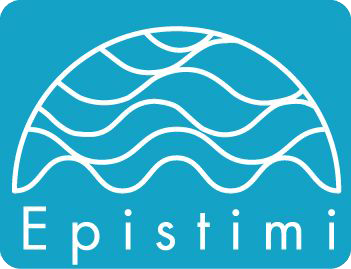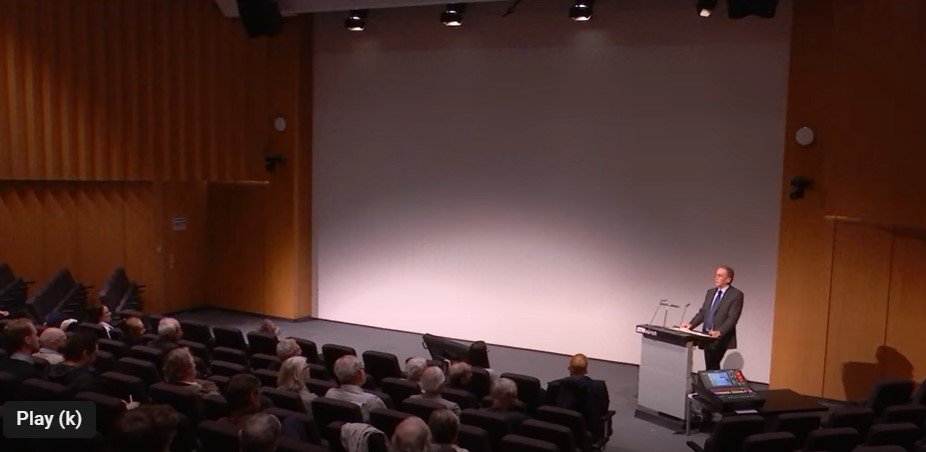The professional destruction of a dual career couple at a preeminent European technical university
Source: YouTube [1]
A recent farewell lecture by Prof. Em. Simon Lilly (ETH Zurich, Switzerland) exposed the backstory to the dismissal of his wife Prof. Marcella Carollo in 2019 as well as the consequences for his own career.
By Janet G. Hering and Patricia A. Maurice
16 April 2024, DOI: 10.5281/zenodo.10939841
In 2002, husband and wife academics Prof. Simon Lilly and Prof. Marcella Carollo were hired by the Swiss Federal Institute (ETH) Zurich. Both were established academics; Lilly was hired as a Full Professor and Carollo was hired as a tenured Associate Professor and promoted to Full Professor in 2007. They were recruited to expand the Institute of Astronomy (which had only a single professorship when they arrived) by starting a program in night-time astronomy from scratch. As reported by an external review in 2020, Profs. Lilly and Carollo built a “world-class effort in observational astronomy with a strong supporting theoretical effort” (quote taken from the text of Prof. Lilly’s lecture, see link below). Profs. Lilly and Carollo received this external recognition even though the Institute had been abruptly dissolved in 2017 by the leadership of ETH Zurich. This action was taken based largely on uninvestigated and unsubstantiated ‘testimonials’ of complaint against Prof. Carollo by a doctoral student whom Prof. Carollo had decided to dismiss from her research group.
The non-transparent, chaotic process that ultimately led to Prof. Carollo’s dismissal had multiple flaws. There was no appropriate investigation before the decision to close the institute was taken. The report on the administrative investigation was delivered to the ETH Zurich leadership before Prof. Carollo had been given a chance to respond to the accusations with factual evidence of her own. The process involved an ombudsman who investigated in a manner inconsistent with national and international guidelines. The case was inappropriately brought to the attention of the news media in a sensationalistic and biased manner. For further details, see the text of Prof. Lilly’s lecture in the link below or watch his lecture on YouTube [1]. In 2019, Prof. Carollo became the first ETH Zurich professor ever to be fired.
Even at that time, I (Janet) asked the question “What does it mean when the first professor recommended for dismissal in 164 years is female?” in a piece I wrote for the ETH Zukunftsblog (“future” blog) [2]. I highlighted “three issues that disproportionately affect female faculty: dual career situations, unconscious bias, and poor governance” – all three of which were in play in this case. Two years earlier in July 2017, I and four other senior women colleagues had written to the then ETH President Prof. Lino Guzzella to stress how important it is that “the role and responsibilities of an Ombudsperson are kept strictly separate from that of an Investigative Officer.” This caution was highly relevant to Prof. Carollo’s case and was obviously not followed.
A colleague in the ETH Zurich Physics Department, Prof. Ursula Keller, gave an interview to an online media outlet, The Republik, in March 2019, just after the announcement that the Board of the ETH Domain would be asked to dismiss Prof. Carollo. The title of the piece quoted Prof. Keller: "For a male professor, the reaction would have been different." In her interview, Prof. Keller highlighted the lack of transparency and due diligence on the part of ETH Zurich. The English translation of Prof. Keller’s interview is available below.
It was not until Prof. Lilly’s lecture, however, that I fully realized how completely excluded Prof. Carollo had been from the chaotic process that was allowed to snowball and ultimately led to her dismissal, the extent to which relevant information had been withheld from her, and how an investigation of alleged scientific misconduct had been misused as an instrument of intimidation.
In effect, the system had allowed, if not fostered, dishonest behavior in a manner reminiscent of the problems we wrote about in our blog post on dishonest colleagues [3]. I must admit that I had also not appreciated the profound damage that Prof. Lilly’s career had suffered even in the absence of any complaints against him.
Key take-home messages
Prof. Carollo’s firing was not appropriate. This is not just our opinion. ETH Zurich convened a commission to make a recommendation on Prof. Carollo’s possible dismissal. The recommendation of this commission was clear and to the point: “Professor Carollo should not be dismissed.” This recommendation was obviously not followed by Prof. Lino Guzzella’s successor as ETH Zurich President, Prof. Joël Mesot. The case was later adjudicated by the Swiss Federal Administrative Court, which, in April 2022, awarded Prof. Carollo 8 month’s salary in damages characterizing “the outright dismissal [as] deemed disproportionate and unjustified in absence of a prior warning” but did not reinstate her [4]. It is one of the peculiar biases of Swiss labor law in favor of institutions that even unjustified dismissals remain ‘valid’. This is especially a travesty for women, who are too often treated unfairly in academia and other sectors.
The processes conducted by ETH Zurich, including activities by the Ombudsman, the administration investigation, and the initiation of the investigation of scientific integrity, were deeply flawed. In his annual report of the Ombuds office for 2015, Prof. Em. Wilfried van Gunsteren, who served as ‘ombudsman’ in the Carollo case, made explicit reference to the historical Swedish model in which an ombudsman has the power to investigate grievances on behalf of individuals. This stands in direct contradiction to international (and Swiss) guidelines for ombudspersons [5]. In the ETH Domain, an administrative investigation is intended to ascertain the facts of a case and not to be aimed against a specific individual [6]. Yet in Prof. Carollo’s case, the report of the administrative investigation made the clearly inappropriate recommendation that she be dismissed without warning. In the investigation of scientific misconduct, the secrecy around the initiation of the investigation, the publicity around the premature actions taken against Prof. Carollo and her research group, the delays in providing relevant information to her, and the long duration of the process are all highly suspect.
Some open questions
Prof. Lilly’s lecture raised some disconcerting questions regarding the various actions taken against him and Prof. Carollo and the motivations behind them. To what extent was there inappropriate collusion among ETH Zurich colleagues, especially those in leadership positions? Were actions taken in the Physics Department motivated by interest in access to resources including tenured professorial positions? What role did dissatisfaction with the former ETH Zurich President, Prof. Lino Guzzella, play in these processes?
As senior women in academia, we have observed all too often cases of unfair, biased treatment against women, particularly those who have achieved a high level of success. Everything we have seen to date suggests that the firing of Prof. Carollo was a prime example of biased treatment against successful women academics in STEMM. An open question might be whether any of this would have happened if she had been a man. We believe this question has already been answered because Prof. Carollo was certainly not the first professor ever to be the subject of a student complaint, but she was the first (and only) ETH Zurich professor ever to be fired and subjected to such a flawed and unprofessional process.
Another open question is whether the firing of Prof. Carollo and the shoddy treatment of Prof. Lilly, her husband, will have a chilling effect on women in STEMM both in Switzerland and worldwide. Prof. Keller suggested as much in her interview (see link to the translated text above). Will it make it harder for ETH Zurich to hire women and dual-career couples as faculty? Will the clearly indefensible accusations of scientific misconduct made against Prof. Carollo as outlined in Prof. Lilly’s lecture ultimately undermine academic integrity in the Swiss system?
Fostering open discussion and upholding academic freedom
It is the practice at ETH Zurich to make recordings of the farewell lectures available on its video portal (https://video.ethz.ch/speakers/lecture.html). Prof. Lilly’s lecture was available for a few hours on the day after his lecture. It was taken down ostensibly for “privacy reasons”, but the information presented in the lecture was either part of the public record or clearly identified by Prof. Lilly as his personal opinion. As of 10 April 2024, it is still not available at the ETHZ lecture site.
The issues raised by Prof. Lilly are of fundamental concern to academics world-wide. They also bear on the trust that the public has in the academic enterprise. To understand these issues, we need to discuss them as openly as possible (recognizing that there may be some valid issues of personal privacy). Fortunately, the recording of the lecture is available on YouTube [1] and readers of this blog post have access to the text (including slides) of the lecture.
We would argue that making the recording of Prof. Lilly’s lecture publically available again through the ETH Zurich video portal would serve to uphold academic freedom and be in the public interest of Swiss taxpayers and the scientific community world-wide.
In closing, here are a few questions to stimulate further thought and discussion:
· Have you experienced or observed abuses of the role of Ombudspersons or in the conduct of investigations of scientific integrity in your institution?
· How well (or badly) do you think that your institution would handle a case like this?
· Do you feel that it would be in the interest of the scientific community that the video of Prof. Lilly’s farewell lecture is available on the ETH Zurich video portal (https://video.ethz.ch/speakers/lecture.html)? If so, you could write to Rainer Borer, Head of Corporate Communications (rainer.borer@hk.ethz.ch), with cc to the ETH Zurich President (president@ethz.ch).
Notes, links, and references
[1] Simon Lilly Farewell Lecture, YouTube, https://www.youtube.com/watch?v=Ua_BhZ0pl30
[2] https://ethz.ch/en/news-and-events/eth-news/news/2019/03/blog-janet-hering-leadership.html
[3] https://www.epistimi.org/blog/liar-liar-campus-on-fire-how-to-cope-with-dishonest-colleagues
[4] Judgment on the dismissal of an ETH professor (2022) https://www.bvger.ch/bvger/en/home/media/medienmitteilungen-2022/kuendigung-ethz.html (in German)
[5] https://ioa.memberclicks.net/assets/docs/SOP-COE/IOA_Standards_of_Practice_English.pdf
[6] https://www.eawag.ch/fileadmin/Domain1/About/Arbeiten/Anstellung/pvo_e.pdf (p. 54)
[HJ1]Please add button with link to lecture text here.
[HJ2]Please add button with link to letter here.
[HJ3]Please add button with link to interview here.

